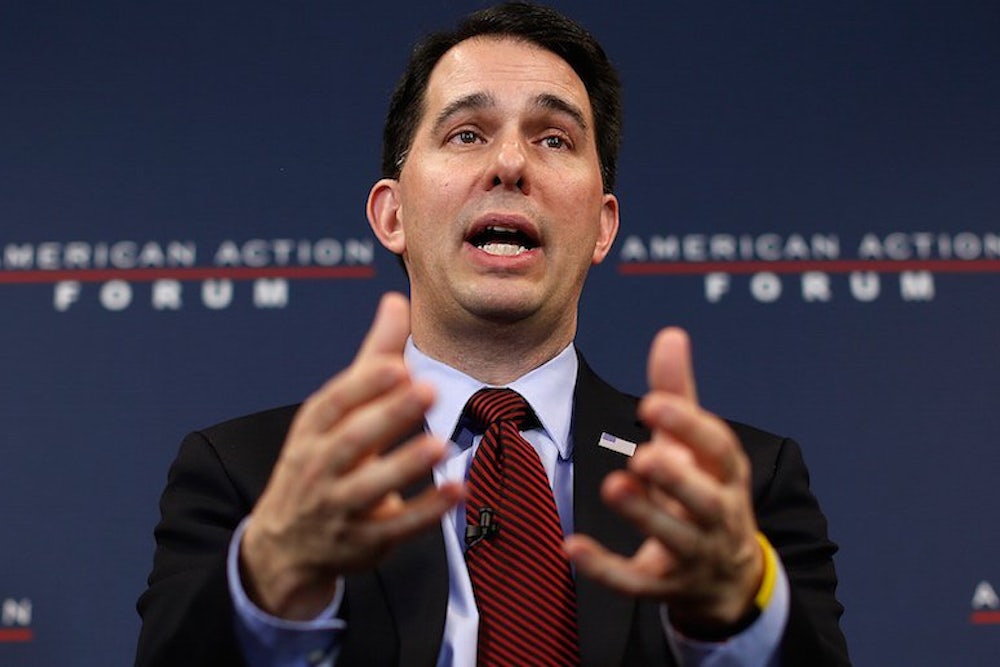Evangelical columnist Cal Thomas’ wrote a seemingly soul-searching op-ed for Fox News' website yesterday that promised to deliver "The truth about faith and conservative candidates." It's always heartening to see a conservative question the unnatural alliance between Christianity and American right-wing politics, but alas, the truth Thomas gets at is not the fact that this alliance typically feels like vicious opportunism. Thomas doesn't castigate conservatives for slashing welfare or resisting broader healthcare coverage; he doesn't shame those who lampooned Ohio Governor John Kasich for citing Christian ethics in his decision to accept Medicaid expansion.
Instead of criticizing the rather sorry state of conservative Christian policy-making, Thomas takes a broader view, introducing the ancient Christian metaphor of the "two cities" to subtly suggest that the work of the Christian faith has no place in politics. Expecting Christian ethics to inflect Christian politicians’ behavior “becomes a power game,” Thomas writes, with “Christians being just one more 'interest group' to be placated with a few breadcrumbs tossed at them by politicians seeking their votes.” This is probably an honest diagnosis of the state of the Christian right, but Thomas, rather than expecting better of allegedly Christian politicians, concludes that Christ’s kingdom is not of this world.
The notion that politics (as the pinnacle of worldly affairs) is decisively separate from the world of spiritual affairs has a long history in Christianity. There are examples in scripture of the idea of two distinct realms of life; Johannes Van Oort points out these bipolar metaphors occur in the books of Isaiah, Hebrews, Galatians, Psalms, and, most importantly to fifth-century bishop St. Augustine of Hippo, the Book of Revelation. In his 426 CE book City of God, Augustine adopted this metaphorical theme, which had variously been expressed as two types of person, two kingdoms, or two specific cities, and developed the long-standing Christian sense of "the two cities." In Augustine’s thought, these two cities consisted of two groups of like-minded persons: those of the City of Man, who love only themselves; and those of the City of God, who love God.
Yet, crucially, Augustine points out that these two cities do not live separately here on earth. While the City of God (that is, those faithful people who love God) journey on earth, they are intermixed with those who love only themselves and pursue only their selfish aims. This means that there is always a mixture of those who are part of the City of God and those who aren’t in every earthly institution. There are, in short, God-loving people involved in state governance, and there are self-loving people involved in the hierarchies of churches. The division of the two cities is exhibited within people, not by their outward segregation.
For the faithful, then, there is no reason to avoid politics, only a compulsion to act according to Christian ethics within politics. On the subject of what Christians should aim for, Thomas gets it exactly right, in the words of the apostle James: “Pure and genuine religion in the sight of God the Father means caring for orphans and widows in their distress and refusing to let the world corrupt you.” That is, to care for the poor, vulnerable, and needy is the Christian mission. Thomas, of course, claims this goal is impossible for Christian politicians to set their sights upon, because few campaigns are won in the name of caring for America’s poor. But that itself is a corruption of the world, and the hard-heartedness of a particular electorate is no reason for Christians to give up the expectation that their political officials, especially those who profess Christianity, will follow through with this aim.
Thomas, like so many on the right, would rather Christians embrace Christianity more fully on the individual level, where “one ultimately affects the social order in ways that the political system is incapable of doing.” But those of the two cities are not separated into discrete quarters, and therefore we can actually have it all: individual Christian communities changing the social order from the bottom up, as well as politicians adhering to Christian ethics pursuing the welfare of the poor and vulnerable in the arena of their profession. To expect less is to give into, rather than to resist, the worldly corruptions that constantly whisper that less can always be done for the weak and poor. They are wrong: there is always more that can be done, and contrary to the subtle cynicism of Thomas’ reading, all Christians are obligated to push efforts on all levels in that direction.
